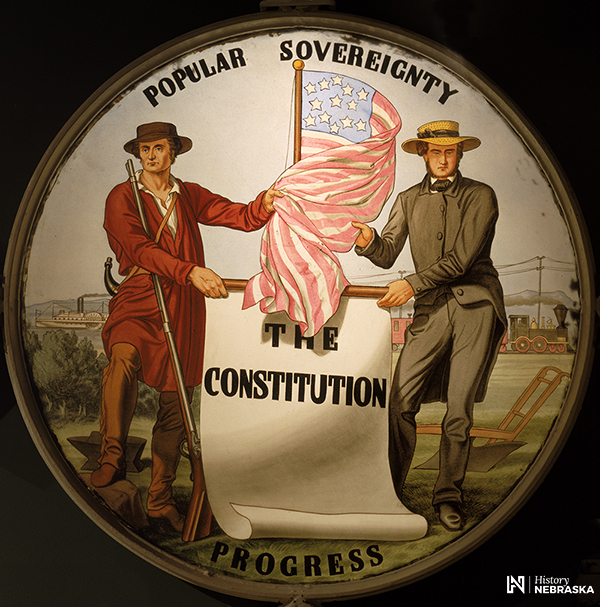The motto on the Nebraska Territorial Seal, “Popular Sovereignty,” was seen as a euphemism for the expansion of slavery.
By David L. Bristow, Editor
Before the Nebraska State Seal was adopted in 1867, a territorial seal served a similar purpose. A painted glass version was installed in a new skylight ceiling in the U.S. Capitol in 1857. (The state seal was added later.) The glass seals came to History Nebraska after being removed during capitol remodeling in 1949.
The territorial seal shares several features with its state counterpart: a steamboat, river, trees, locomotive, anvil, and distant hills or mountains. It also includes a plow (replaced by a shock of wheat in the state seal), a telegraph line, a U.S. flag and Constitution, and two men: a frontiersman with musket and powder horn, and a prosperous-looking man in a tailcoat and planter’s hat. Other than the land itself, each item represents something transformative; together they illustrate the settlers’ notion of “progress.”
But laid across the top were two words that spelled out red-hot controversy. “Popular sovereignty” was the catchphrase associated with the Kansas-Nebraska Act of 1854. This law organized the new territories while repealing the Missouri Compromise of 1820, which had prohibited slavery in the region where the two territories were later formed. Now the “Nebraska bill” re-opened the slavery question, to be decided by each territory’s citizens.
In this context, “popular sovereignty” was bitterly resented by the “anti-Nebraska” men who founded the Republican Party. They heard it not as a statement of democratic ideals, nor even as a middle way of resolving the nation’s most contentious issue, but as a euphemism for the expansion of slavery. They feared the country would be dominated by the “Slave Power,” as they termed the Southern planter aristocracy.
Nebraska was not expected to become a slave state, though its legislature did not ban slavery until 1861, and only then over the governor’s veto. “Bleeding Kansas,” however, was violently contested, foreshadowing even greater bloodshed during the Civil War.
When Nebraska became a state in 1867, a controversy over Black voting rights led to the adoption of our state motto, “Equality Before the Law.” Read more.
Posted Feb. 28, 2022. An earlier version of this article appeared in the Winter 2016 issue of Nebraska History Magazine.
Photo: History Nebraska 7434-1
For further reading:
Eric Foner, Free Soil, Free Labor, Free Men: The Ideology of the Republican Party before the Civil War (Oxford University Press, reprint edition 1995).
James E. Potter, Standing Firmly by the Flag: Nebraska Territory and the Civil War, 1861-1867 (University of Nebraska Press, 2012).




